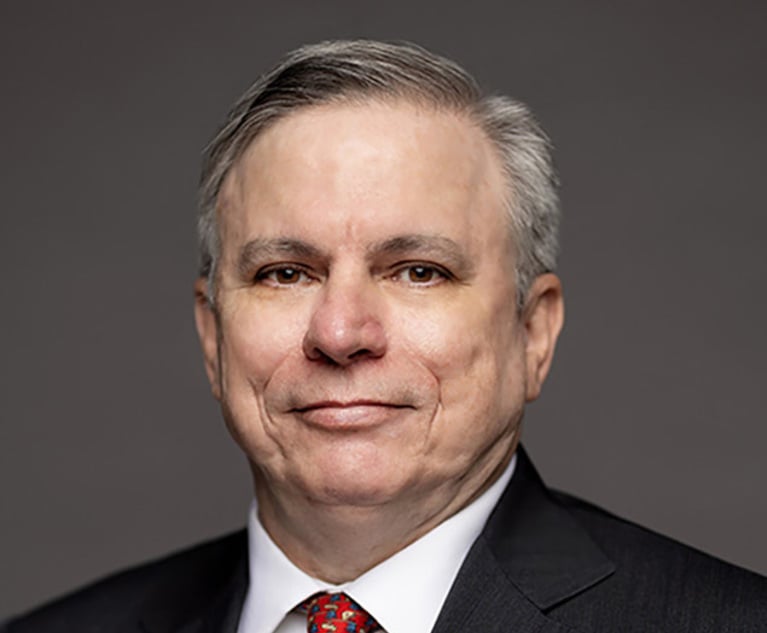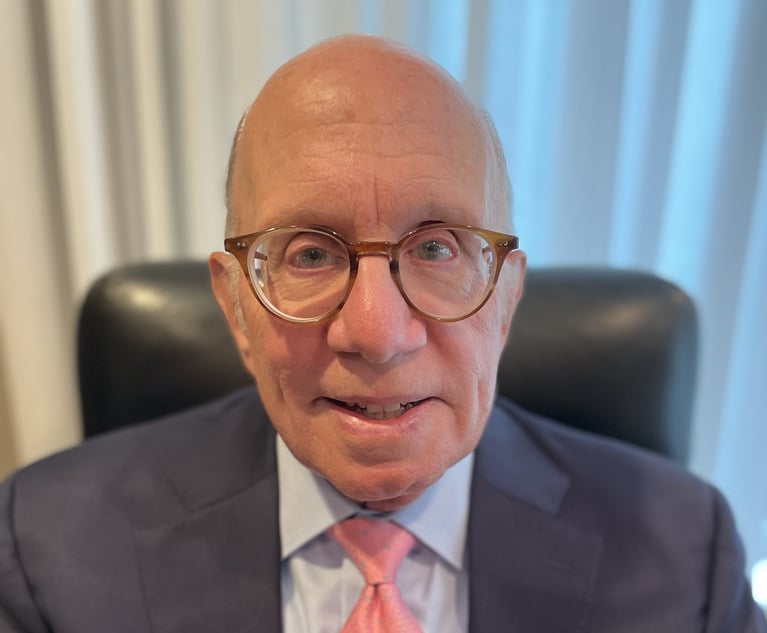 Protestors in Sproul Plaza on the UC Berkeley Campus
Protestors in Sproul Plaza on the UC Berkeley CampusThe University President's Role in Addressing Offensive Campus 'Speech'
To Sexton, there is little more important than dialogue—or, rather, dialogic dialogue where people seek to learn from each other.
July 19, 2019 at 11:00 AM
8 minute read
What do you think about the story that follows? And, more important, what would John Sexton, a true thought leader with more experience in academia than most anyone, think about it?
In the immediate wake of 9/11—indeed, on 9/12, while the WTC embers still burned unendingly—a Yale University professor led a seminar discussion in which some students suggested that it was the different life circumstances of American university students from those of the 9/11 perpetrators that caused the previous day's events. The professor actually added his own two cents—hardly worth more: He saw little difference between Hamas suicide bombers and American soldiers who died fighting in World War II. Just imagine! Sort of like—Hitler must have had his reasons, let's consider?
One student, Alison Hornstein, raised her hand to challenge the thinking. She wanted to highlight the unchallengeable distinction, but she wasn't called on. As she later wrote, “American soldiers, in uniform, did not have a policy of specifically targeting civilians; suicide bombers, who wear plainclothes, do.” The students who were called on cited various explanations for terrorism. But none questioned the simple fact that sometimes wrong is wrong and there can be no absolution for that kind of wrongdoing. In her thought-provoking article in Newsweek, “The Question We Should Be Asking,” Dec. 17, 2001, 138:25, 14, Hornstein tersely reported: “I had to drop the class.”
She might have put it differently. She might have said, as might I: For some issues there's only one side; and dialogue, sometimes, is nothing more than a game played by intellectual elitists. And given the monstrosity of 9/11, dialogue that lacks condemnation is only for effete “thinkers” and nothing more.
That 2001 Yale seminar might lend background for a discussion of the complex issues raised by academia today explored by John Sexton, President Emeritus of New York University and former dean of its law school, in his exciting new book Standing for Reason: The University in a Dogmatic Age (Yale Univ. Press). Sexton, to be sure, is all about academic freedom and dialogue. Indeed, in his gifted review of Sexton's book published in these pages on June 26, 2019, (ret.) Judge Joseph N. Bellacosa provided the book's well-deserved encomia.
If one were, momentarily, to foolishly challenge the gravitas of Sexton's writing (and inspired, catholic (small “c”)) thinking, one need go further than the forward written by, catch this, former British Prime Minister Gordon Brown, and the book blurbs from the likes of Hillary Rodham Clinton, James Carroll (author of Constantine's Sword), Vartan Gregorian (president of the Carnegie Corporation of New York, and former president of Brown University) and Rabbi Lord Jonathan Sacks (former chief rabbi of the United Kingdom). For these varied thinkers, the value of “dialogue,” perhaps the core issue in Sexton's volume is exactly what the university—today's “academy”—is about. But, one must ask, as in the instance of the Yale seminar above, aren't there limits to the benefits of dialogue?
Sexton, as he tells us, made a choice when he was named NYU's president—rather than opine on every issue he was asked to publicly comment about (from Iraq to ARod to the Washington Square Park dog run), he chose, instead, to publicly opine on nothing, unless it was specifically related to the mission of the university. He even refused to join other law school deans in signing an open letter opposing then-Mayor Giuliani's dramatic budget cuts to Legal Aid, notwithstanding his fervent belief that the cuts were dead wrong. To opine, he believed would have compromised his ability to “protect the capacity for dialogue on campus.” To Sexton, there is little more important than dialogue—or, rather, dialogic dialogue where people seek to learn from each other. The idea is premised in Sexton's Jesuit training and the belief that one can only get to the truth through constructive dialogue. And what better place to do that than in our schools of higher education?
Sexton vigorously criticizes “secular dogmatism,” positing that we have reached a place where discourse (and, in particular, political discourse) is all but impossible—we have become too dug in to our positions to actually listen to what the other side is saying. According to Sexton, it is universities that are the cure—a 2018 survey found that 98% of university and college presidents rated protecting free speech as extremely, or very, important, and 96% would be in favor of exposing students to many types of speech. Including that of the Yale professor mentioned above?
Yet, one wonders what Sexton would make of Harvard's decision, over the protest of 52 Harvard Law professors, to remove law professor Ronald Sullivan and his wife, Stephanie Robinson, from their positions as faculty deans of an undergraduate residential house because Sullivan represented Harvey Weinstein and students ostensibly felt “unsafe” with Sullivan. Or Columbia Law School, upon a petition of a black students' association, basically forcing the resignation of part time lecturer Elizabeth Lederer because she was lead prosecutor in the Central Park Five case 30 years ago, which has come under tumultuous attack in a dramatized (and, notably, partly fictionalized) movie about the case. Free speech by students? For sure. Dialogic? It doesn't seem so.
Sexton also does not deal with anti-Semitism on campuses, which we have seen more frequently. Columbia University saw blood-red swastikas and “yid” painted on a professor's walls. A swastika was painted on a mural honoring the Tree of Life Synagogue victims at Duke. Swastikas were drawn in the snow at Cornell. A fraternity at Penn State had its menorah vandalized. In Sexton's own NYU, in an incident after Sexton was no longer president and after his book went to print, the school's current president, in the face of considerable Jewish and pro-Zionist protest, publicly criticized a student graduation speaker who used that forum to express his personal views on boycott, divestment and sanctions (a section of the speech reportedly not included when he submitted it to NYU before the ceremony). NYU's president, curiously, was criticized for obstructing free speech, his critics objecting even to the fact that the speech had to be delivered in advance. Others complained the school allowed anti-Zionist rhetoric at its commencement.
Perhaps an example of Sexton's secular dogmatism—everyone is talking; no one is listening. What would Sexton have done if he had still been president and had the speech's draft in advance? And what would he have done if the speech had been given and was a fait accompli? Tough job being a university president nowadays!
“Professor” Sexton sends us back to our history books when he writes about philosopher Karl Jaspers who wrote insightfully about the “Axial Age” (800-200 BCE) i.e., the era in which humans developed the idea of individuality. Sexton's teacher—Ewert Cousins of Fordham, c. 1963—argued that we're entering the Second Axial Age, where our sense of individuality would integrate with the collectivity of a new global era. The idea is that there would be worldwide, creative unions, in which diversity is nurtured and enriched. And Sexton's “global” thinking led him to encourage and move NYU to open schools in Abu Dhabi and Shanghai, which he sees as “ecumenical portals.”
Sexton is of course correct—dialogue in our universities and colleges is the key to our future. But dialogic intercourse, it seems, often remains aspirational. If we currently exist in the Second Axial Age, it is still nascent. One can hope, but we are not there yet. Because we still need to understand why Alison Hornstein's Yale professor, or Columbia Law School (re Elizabeth Lederer) and Harvard University (re the Sullivans) acted, apparently, to end dialogue and discussion. I guess this is a challenge: no longer the president of a university, there's no reason for John Sexton to hold back from the public his personal opinions on the burning issues of the day. And while it would be good to hear what Sexton has to say on these particular examples, all of which took place after his book was published, his insights may (one hopes) help readers to form their own well-informed opinions. And maybe even help them start a truth seeking dialogue! Something which all of us, but particularly students, desperately need.
Joel Cohen practices white-collar criminal defense law as senior counsel at Stroock & Stroock & Lavan, and is an adjunct professor at Fordham Law School.
This content has been archived. It is available through our partners, LexisNexis® and Bloomberg Law.
To view this content, please continue to their sites.
Not a Lexis Subscriber?
Subscribe Now
Not a Bloomberg Law Subscriber?
Subscribe Now
NOT FOR REPRINT
© 2024 ALM Global, LLC, All Rights Reserved. Request academic re-use from www.copyright.com. All other uses, submit a request to [email protected]. For more information visit Asset & Logo Licensing.
You Might Like
View All
Why Is It Becoming More Difficult for Businesses to Mandate Arbitration of Employment Disputes?
6 minute read
Trending Stories
- 1Gibson Dunn Sued By Crypto Client After Lateral Hire Causes Conflict of Interest
- 2Trump's Solicitor General Expected to 'Flip' Prelogar's Positions at Supreme Court
- 3Pharmacy Lawyers See Promise in NY Regulator's Curbs on PBM Industry
- 4Outgoing USPTO Director Kathi Vidal: ‘We All Want the Country to Be in a Better Place’
- 5Supreme Court Will Review Constitutionality Of FCC's Universal Service Fund
Who Got The Work
Michael G. Bongiorno, Andrew Scott Dulberg and Elizabeth E. Driscoll from Wilmer Cutler Pickering Hale and Dorr have stepped in to represent Symbotic Inc., an A.I.-enabled technology platform that focuses on increasing supply chain efficiency, and other defendants in a pending shareholder derivative lawsuit. The case, filed Oct. 2 in Massachusetts District Court by the Brown Law Firm on behalf of Stephen Austen, accuses certain officers and directors of misleading investors in regard to Symbotic's potential for margin growth by failing to disclose that the company was not equipped to timely deploy its systems or manage expenses through project delays. The case, assigned to U.S. District Judge Nathaniel M. Gorton, is 1:24-cv-12522, Austen v. Cohen et al.
Who Got The Work
Edmund Polubinski and Marie Killmond of Davis Polk & Wardwell have entered appearances for data platform software development company MongoDB and other defendants in a pending shareholder derivative lawsuit. The action, filed Oct. 7 in New York Southern District Court by the Brown Law Firm, accuses the company's directors and/or officers of falsely expressing confidence in the company’s restructuring of its sales incentive plan and downplaying the severity of decreases in its upfront commitments. The case is 1:24-cv-07594, Roy v. Ittycheria et al.
Who Got The Work
Amy O. Bruchs and Kurt F. Ellison of Michael Best & Friedrich have entered appearances for Epic Systems Corp. in a pending employment discrimination lawsuit. The suit was filed Sept. 7 in Wisconsin Western District Court by Levine Eisberner LLC and Siri & Glimstad on behalf of a project manager who claims that he was wrongfully terminated after applying for a religious exemption to the defendant's COVID-19 vaccine mandate. The case, assigned to U.S. Magistrate Judge Anita Marie Boor, is 3:24-cv-00630, Secker, Nathan v. Epic Systems Corporation.
Who Got The Work
David X. Sullivan, Thomas J. Finn and Gregory A. Hall from McCarter & English have entered appearances for Sunrun Installation Services in a pending civil rights lawsuit. The complaint was filed Sept. 4 in Connecticut District Court by attorney Robert M. Berke on behalf of former employee George Edward Steins, who was arrested and charged with employing an unregistered home improvement salesperson. The complaint alleges that had Sunrun informed the Connecticut Department of Consumer Protection that the plaintiff's employment had ended in 2017 and that he no longer held Sunrun's home improvement contractor license, he would not have been hit with charges, which were dismissed in May 2024. The case, assigned to U.S. District Judge Jeffrey A. Meyer, is 3:24-cv-01423, Steins v. Sunrun, Inc. et al.
Who Got The Work
Greenberg Traurig shareholder Joshua L. Raskin has entered an appearance for boohoo.com UK Ltd. in a pending patent infringement lawsuit. The suit, filed Sept. 3 in Texas Eastern District Court by Rozier Hardt McDonough on behalf of Alto Dynamics, asserts five patents related to an online shopping platform. The case, assigned to U.S. District Judge Rodney Gilstrap, is 2:24-cv-00719, Alto Dynamics, LLC v. boohoo.com UK Limited.
Featured Firms
Law Offices of Gary Martin Hays & Associates, P.C.
(470) 294-1674
Law Offices of Mark E. Salomone
(857) 444-6468
Smith & Hassler
(713) 739-1250








